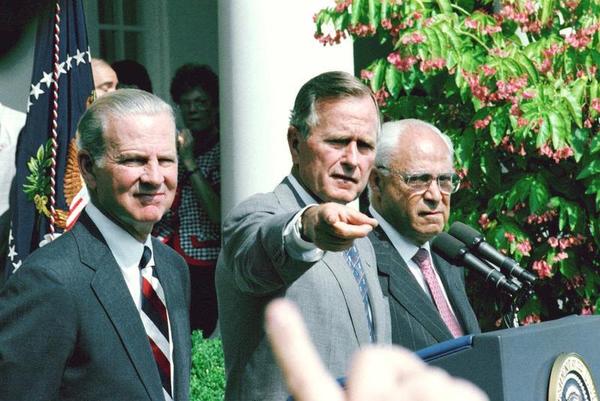Bush the Elder's Presidency is Undervalued
By Ned Lamont
RealClearPolitics.com

“I’d rather be a really good one-term president than a mediocre two-term president,” Barack Obama said, well before his 2012 re-election. Most historians do not seem to believe that a really good president can be a one-termer. Two-thirds of presidents have not been re-elected (generally due to death or defeat), but in most academic rankings James Polk is the lone single-termer to crack the Top 10.
Polk may be a stumper in a game of “Jeopardy!,” but he did double the size of the United States in four short years, and only ill health forced him to step aside after one term in the White House.
Maybe it is time to add another one-termer to the pantheon: George Herbert Walker Bush. Presidential surveys put him in the middle of the pack, but he should be moving up. We have had mostly foreign policy rookies as president over the last generation. But as the Berlin Wall came crashing down and Saddam Hussein invaded Kuwait, the man in the Oval Office was a decorated war hero and had been a U.S. envoy to the United Nations, ambassador to China, CIA director, and Ronald Reagan’s vice president. America was well-served by his experience and his character.
Like Dwight Eisenhower a generation before him, Bush 41 was on firm footing when he stood up to the militarists who wanted to expand the scope of Operation Desert Storm and take out Saddam Hussein.
As Bush wrote in his memoirs, “Had we gone the invasion route, the United States could conceivably still be an occupying power in a bitterly hostile land.” Victory belonged to American leadership and an eclectic international coalition, including troops from Syria and Egypt, with support from Russia and much of the cost picked up by Saudi Arabia.
The collapse of the Soviet Union was the transformative event of the late 20th century. Engaging Mikhail Gorbachev and integrating the new Russia into the new world order was politically controversial -- and described as naïve -- but Bush had the credibility and the resolve to stand up to the doubters. President Obama is now confronting a more aggressive Russian leader and a war caucus pushing for a more assertive U.S. military posture in Iran and Syria and Ukraine. It is worth asking: What would George the Elder do?
On the domestic front, he sought out a 1990s version of the grand bargain, a budgetary mix of tax increases and spending cuts. On the political front afterward, Bush was vilified, particularly by conservatives: “Read my lips, I lied,” screamed the New York Post. Pat Buchanan roughed him up in the 1992 Republican primaries, Ross Perot finished him off in the general election, and Bill Clinton was made president.
But on Bush’s watch, the top income tax bracket was raised from 28 percent to 31 percent and real discretionary spending started trending down. The federal budget deficit declined during his last year in office, eventually morphing into a surplus over the next eight years. As a one-termer, he got precious little credit for the rising employment rate, which began improving before he even left office, or a stock market surge that also began on his watch and continued for most of Bill Clinton’s time in office. The market gains during Bush’s tenure exceeded those of John F. Kennedy and Franklin Roosevelt, but did not quite match Clinton and Reagan. (The presidential stock market king is Calvin Coolidge, followed by… Barack Obama.)
Bush the Elder’s term was an extraordinary four years for our country and helped lay the groundwork for another eight years of peace and prosperity, something acknowledged by the JFK Library Foundation last week when it named George H.W. Bush a 2014 recipient of the prestigious John F. Kennedy Profile in Courage Award for the political fortitude he demonstrated in dealing with the federal budget.
“President George H. W. Bush risked his reputation and ultimately his political career,” said President Kennedy’s grandson, Jack Schlossberg, “and should not be forgotten.”
As Bill Clinton once opined, “It’s better to be strong and wrong than weak and right”—and Bush was unfairly challenged for being weak. “No time to go wobbly, George,” Iron Lady Margaret Thatcher famously chided him during Desert Storm. “Saturday Night Live’s” Dana Carvey portrayed the president as hesitant, cautious and prudent. Worst of all, Newsweek magazine put him on its cover under a headline reading “The Wimp Factor.” What a cheap shot.
Twenty-year-old George H. W. Bush was the U.S. Navy’s youngest aviator in World War II. Near Iwo Jima was the tiny Pacific island Chichijima, and Bush’s squadron was sent to take out its radio tower. Although his plane was hit and the cockpit filled with smoke, he struck the target and started flying out to sea. He told his crew to parachute out before he himself dove out onto the wing of the plane, pulled the rip cord too early, thus banging his head, and soon found himself bleeding in a tiny life raft miles from shore. Armed Japanese vessels were headed his way when young Bush saw a periscope cut through the water. It belonged to a U.S. Navy submarine, the USS Finback, which rescued him just in time to avoid capture and torture on Chichijima.
“I hope my own children never have to fight a war -- friends disappearing, lives being extinguished. It’s just not right,” he told journalist Paula Zahn much later. “The glory of being a fighter pilot has certainly worn off.”
His speechwriters could never get President Bush to talk much about the war, even while his adversaries—and sometimes even his friends—caricatured him as weak. But he was often right on the big issues, and history will show that he was a really good one-term president who never stopping serving his country.

